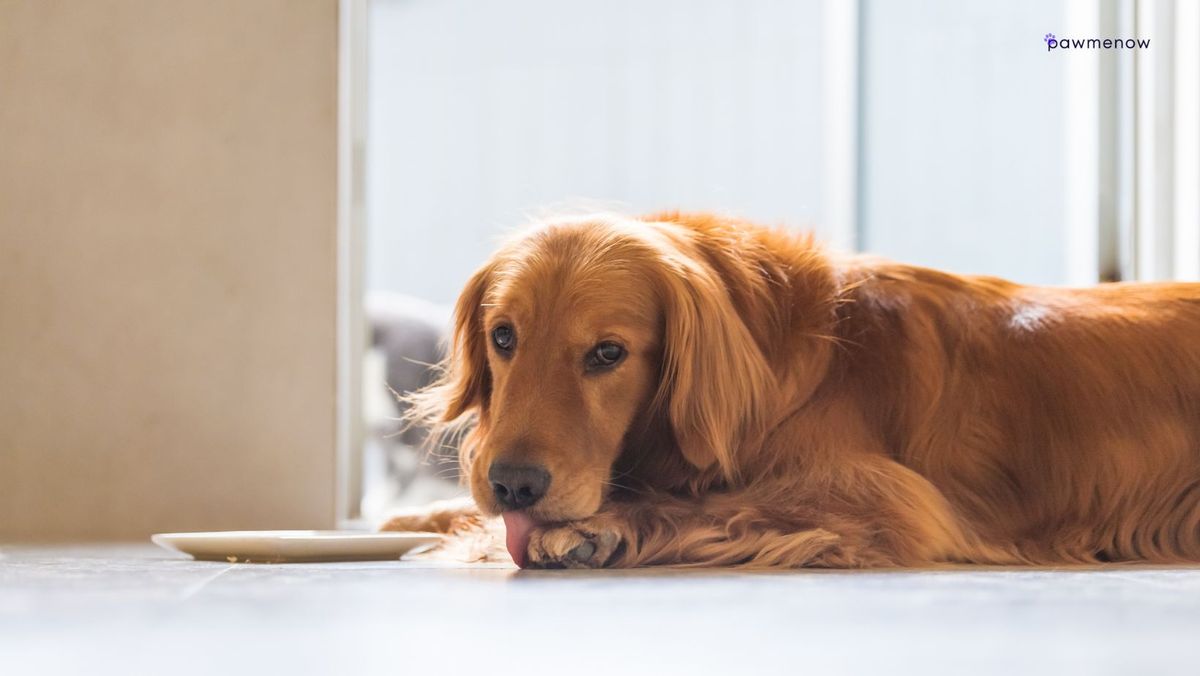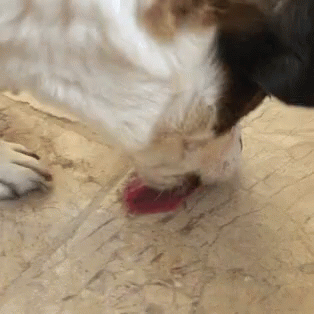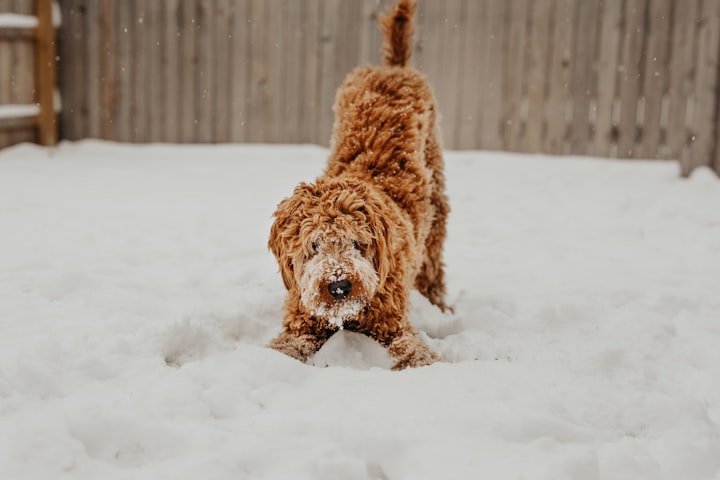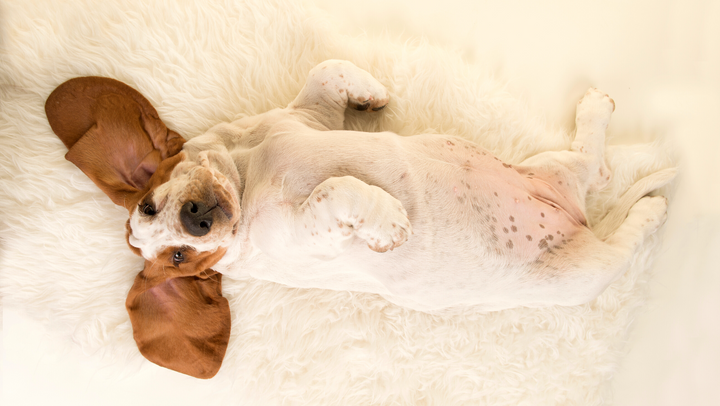Dog Licking Floor Constantly? 7 Reasonable Explanations
Are you confused by your dog's persistent licking of the floor? Learn the causes of this strange behavior and how to deal with it. 👅

Dogs are fascinating creatures with a wide range of behaviors that can sometimes leave us puzzled. One such behavior is when your dog starts licking the floor constantly. While it might seem odd or even worrisome, there are several reasonable explanations for this behavior.
In this article, we'll explore some of the common reasons why dogs might engage in this behavior and what you can do to address it.
Why does my dog constantly lick the floor and carpet?

❶ Exploration and Taste Sensation
Dogs primarily experience the world through their senses, and their sense of taste is no exception. Licking the floor could be your dog's way of exploring its environment and trying to identify interesting scents or tastes that have been left behind. Sometimes, the remnants of food, spilled beverages, or even cleaning products can be intriguing to dogs. This behavior might be especially noticeable in dogs with heightened senses of smell and taste.
❷ Nutritional Deficiencies
If your dog is not receiving all the essential nutrients it needs from its diet, it might start seeking out alternative sources. Licking the floor could be a sign that your dog is trying to find minerals or nutrients that are lacking in its regular meals. If you suspect this might be the case, it's a good idea to consult with your veterinarian to ensure your dog is on a balanced diet.
❸ Medical Conditions
Certain medical conditions can lead to excessive licking behaviors in dogs. Gastrointestinal issues, like an upset stomach or acid reflux, might prompt a dog to lick the floor in an attempt to alleviate discomfort. Similarly, dogs with dental problems might lick the floor due to mouth pain. If your dog's floor-licking is accompanied by other concerning symptoms, such as vomiting, diarrhea, or weight loss, it's crucial to consult a veterinarian for proper diagnosis and treatment.
❹ Behavioral Obsessiveness
Dogs can develop compulsive behaviors just like humans. If your dog's floor-licking is excessive and seems to be repetitive, it could be a sign of a behavioral disorder. Compulsive licking might be triggered by anxiety, stress, or boredom. Identifying the root cause of the anxiety or stress and addressing it through training, environmental enrichment, or professional behavioral help can help curb this behavior.
❺ Pica
Pica is a condition where animals consume non-food items. This might include licking or chewing on objects like the floor, walls, or furniture. Pica can result from nutritional deficiencies, behavioral issues, or even genetic predisposition. It's important to consult a veterinarian if your dog displays signs of pica to rule out any underlying health issues and develop a plan to manage the behavior.
❻ Environmental Factors
Dogs are highly sensitive to changes in their environment. New scents, cleaning products, or other changes might trigger your dog's curiosity and lead to floor-licking behavior. This is particularly true if you've recently used cleaning products with strong scents or chemicals that your dog finds interesting.
❼ Learned Behavior
Dogs are excellent at learning from their surroundings and from their interactions with humans. If your dog has received attention or rewards for licking the floor in the past, it might repeat the behavior to seek out the same positive reinforcement.
What do you do when your dog won't stop licking the floor?
If your dog is frantically licking the floor, here's what you can do:
| What to Do | Description |
|---|---|
| Observe and Assess | Pay attention to when and where your dog licks the floor. Is it associated with certain times of the day, locations, or activities? This can provide insights into potential triggers. |
| Check for Medical Issues | Consult your veterinarian to rule out any underlying medical conditions that could be causing the excessive licking behavior. Gastrointestinal problems, dental issues, allergies, and skin irritations are among the potential concerns. |
| Review Diet | Ensure your dog is on a balanced and nutritious diet. If nutritional deficiencies are suspected, your vet might recommend dietary changes or supplements. |
| Environmental Enrichment | Provide mental and physical stimulation for your dog. Engage in regular playtime, walks, and provide interactive toys to combat boredom and reduce anxiety. |
| Training and Distraction | Teach your dog alternative behaviors to replace floor-licking. Commands like "sit," "stay," and "leave it" can redirect their focus. Use treats and positive reinforcement to reward desired behaviors. |
| Eliminate Triggers | If you've identified specific triggers, try to minimize or eliminate them. For example, if certain cleaning products attract your dog, opt for pet-friendly alternatives with milder scents. |
| Address Anxiety and Stress | If your dog's licking seems related to anxiety or stress, consult a professional dog trainer or behaviorist. They can help develop a behavior modification plan or recommend calming techniques. |
| Health and Dental Care | Regular veterinary check-ups are crucial. Maintain your dog's oral health by providing dental treats or brushing its teeth, as dental discomfort could lead to licking. |
| Pica Management | If your dog is exhibiting pica behavior, keep non-food items out of its reach. Providing appropriate chew toys can help redirect its chewing impulses. |
| Positive Reinforcement | Whenever you catch your dog not licking the floor, offer praise and rewards. Positive reinforcement can reinforce the desired behavior of not licking. |
| Professional Help | If the floor-licking behavior persists or worsens, consider seeking guidance from a veterinary behaviorist or certified dog trainer. They can provide tailored solutions based on your dog's specific needs. |
| Consistency and Patience | Changing a behavior takes time. Stay consistent in your approach and be patient with your dog's progress. Avoid scolding or punishing, as it can exacerbate anxiety and complicate the issue. |
In the delightful world of dogs, quirks, and behaviors can sometimes leave us scratching our heads. If you've ever wondered why your furry friend is fixated on licking the floor, fear not! Through this article, we've explored several plausible explanations.
Remember, your dog's floor-licking might be its way of exploring new scents, seeking nutrients, or even expressing anxiety. By observing, assessing, and engaging with your pup, you can decode the mystery behind this behavior.
Whether it's a nutritional tweak, a game of fetch, or a friendly visit to the vet, you're now equipped with tools to tackle the issue. Keep in mind that patience, positive reinforcement, and professional advice are your allies on this journey.
Frequently Asked Questions
My dog won't stop licking the floor and vomiting. What should I do? Your dog's floor licking and vomiting could indicate underlying issues. Consult a vet to identify and address the problem promptly.
Why is my senior dog licking the floor? In addition to the reasons described in the article, dementia may also be the reason why an older dog licks the floor nonstop. Don't panic just yet, though. The best course of action is to contact a veterinarian right away.
Why does my dog lick the floor with an upset stomach? Dogs may lick the floor when they have an upset stomach as a way to soothe discomfort or alleviate nausea.
More related weird behaviors in dogs:
- My Dog Ate a Tea Bag: What Should I Do?
- Help! My Dog Ate Drywall – What to Do Next
- Dog Ate Cardboard? Here's What You Need to Know
- Dog Ate a Tennis Ball? Steps to Ensure Your Pup's Safety
- Dog Ate a Vaseline: Should You Be Worried? Here's What to DO
- Dog Ate a Sock: What Happens? Keep Calm & Follow This Guide
- My Dog Ate Cat Poop: Why & How to Stop This Gross Behavior


![Are Vizslas Aggressive with Dogs & Humans? [Breed Behavior]](/content/images/size/w720/2022/07/dog-5490238_1920.jpg)

Comments ()